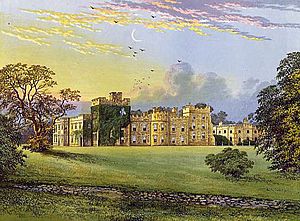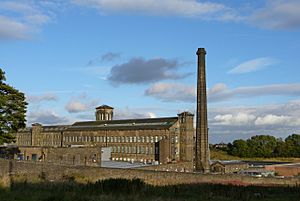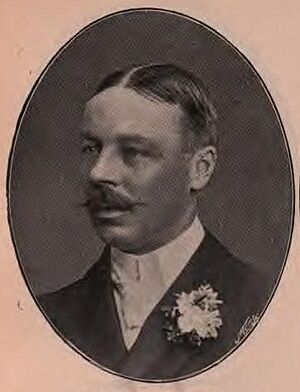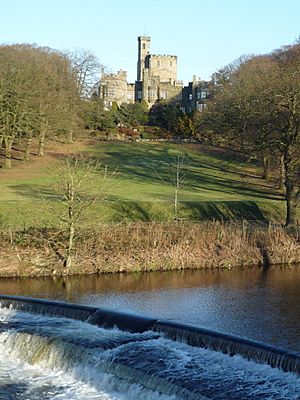William Henry Foster (Lancaster MP) facts for kids

William Henry Foster (born in 1848 – died on 27 March 1908) was a British businessman and a politician from the Conservative Party. He owned the Black Dyke Mills in Yorkshire, which made fabrics. He also lived in Hornby Castle in Lancashire. He was a member of the UK Parliament from 1895 to 1900.
His Life and Work

William Henry Foster was the son of William Foster. His family lived at Hornby Castle, Lancashire and in Queensbury, near Bradford. He studied in Liverpool and in other countries. After his studies, he joined his family's business, which made fabrics. In 1842, he became a director at John Foster and Son Ltd in Queensbury.
His family's company, Black Dyke Mills, was very important in the village of Queensbury. It grew to become one of the world's biggest makers of worsted cloth, which is a special type of wool fabric. His grandfather, John Foster, started the company. After his grandfather retired to Hornby Castle, his father, William, took over the business.
William Henry Foster held several important local positions. In June 1891, he was named High Sheriff of Lancashire. This was an important role in the county. In September 1892, he became a Deputy Lieutenant for the West Riding of Yorkshire. He also served in the military as a Lieutenant-Colonel in the 2nd West Yorkshire Yeomanry Cavalry. He retired from this role in 1892 with the honorary rank of Colonel.
Becoming a Politician
In 1895, William Henry Foster was chosen to be a Member of Parliament (MP) for the Lancaster area in Lancashire. He had been asked to run for this position in 1893, but another person was chosen at first. Later that year, people in Lancaster asked him again to be their candidate, and he agreed. He officially became a candidate on 29 June 1895.
After he won the election on 19 July 1895, some people made a complaint about the election. They claimed that William Henry Foster and his team had done things that were not allowed during the election. There were many claims, including that he had offered jobs at his mills in Queensbury to voters. William Henry Foster denied these claims. He told the court that he had only mentioned that work was available at his mills during a meeting where his record as an employer was being criticized.
The court heard all the details at Lancaster Castle. On 24 January, the judges decided that all the claims against William Henry Foster were false. They ordered the people who made the complaint to pay his legal costs. The court found that he had followed all the rules for election spending.
William Henry Foster remained the MP for Lancaster until the 1900 election. In that election, he lost by a very small number of votes. He tried to become an MP again in the 1906 election, but he lost again.
His Family and Passing
In 1879, William Henry Foster married Henrietta. She was the daughter of Canon J.H. Warneford, who lived in Wiltshire and Halifax.
William Henry Foster passed away on 27 March 1908, when he was 60 years old. His funeral was held in Hornby. Many important people, including the Lord Mayor of Bradford and the MP for Lancaster, attended his funeral. More than 200 flower wreaths were sent to honor him.
 | Madam C. J. Walker |
 | Janet Emerson Bashen |
 | Annie Turnbo Malone |
 | Maggie L. Walker |



